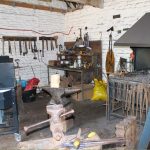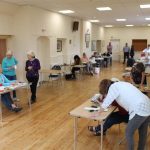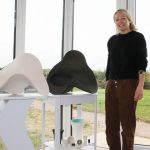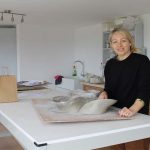post

Bee hives, mobile forges and modern kitchens have been amongst the finished improvements made to Sacrewell Farm and Maxey Village Hall which, received a combined total of £91,400 grant funding from the LEADER programme.
Sacrewell Farm received just under £23,000 grant funding to set up on beehives and beekeeping equipment with plans in place to set up a honey production centre, completed work on additional shower facilities, created covered outdoor spaces for their volunteer-led events and purchased a mobile forge for their blacksmith to use at shows across the country to promote the farm.
Richard Hadfield, Strategic Projects Manager at Sacrewell Farm explains more about the plans for the historic site, “We’re really proud of the role that Sacrewell Farm plays in local agricultural education and are always looking to offer something new for our visitors!
“Ultimately we want to achieve organic growth for the farm and grants like LEADER are a huge boost to achieving our goals. There’s around 50-acres that we can use and we’re really keen to uncover and share as much of the farm’s history and heritage as we can.”
Maxey Village Hall has undergone significant modernisation to bring the electrics and heating system up to date, provide tarmacked parking and install a new kitchen with improved access to the hall’s meeting rooms.
The improvements, which received partial grant funding of £68,000 from LEADER, have allowed additional features to be incorporated such as wifi and hearing loops.
Mark Asplin, Chair of the Association said, “We’ve wanted to make improvements to the hall for quite a few years so we’re absolutely delighted that it’s become a reality. The kitchen had been a bit of a stumbling block for bookings in the past but thanks to the extension we can hire both rooms out for private use and give everyone separate access to it.
“The building is a beautiful piece of history for the village; up until the mid-1960s it was used as a school! Thanks to the grant, we’ve been able to make it even more useful for the community so we can preserve local heritage and ensure people have a hub.”
In addition to the Peterborough projects, Simmons Optometrists in Oakham and ceramics artist, Katherine Staples have both successfully modernised and expanded their operations thanks to a combined £52,700 worth of grant funding from the LEADER programme.
Simmons Optometrists in Oakham received a £40,100 grant towards a building extension that has created more private consultation areas for customers, provided greater accessibility and incorporated more modern display units for the store.
James Alexander, one of the practice’s directors said, “The improvements achieved through the LEADER programme have really enhanced the level of customer care we can offer and allows us the space to develop the business over the coming years.
“Thanks to the funding we’ve extended our premises so that we can see more patients, but still give them the time, space and care they’ve come to expect from us – we can already see the difference it will make to us going forward!
“The whole place feels much more bright and contemporary, and gives us a much more practicable and inviting environment for our staff to work in and our customers to visit. Already we’ve received a fantastic reaction from our patients, who really seem to appreciate the hard work put in.”
Katherine Staples, a ceramics artist, has also finished construction of a studio complete with industrial kilns for use on her own creations and for the classes she aims to set up thanks to a £12,600 grant. With her children going to school, Katherine is getting back into producing large scale commissions and wants to bring the mental health benefits of artwork to a wider audience.
“It’s been so rewarding to get back into project work and I’ve been blown away with the support from the local community. Without this grant I would have really struggled to get my business off the ground so quickly.
“Art is such a fantastic outlet. Personally I’ve found working with clay very therapeutic and that’s what I want for my workshops – for people to unleash their creativity, really use their imagination and get a boost from socialising and learning new skills.”
LEADER funding aims to boost the rural economy, from supporting tourism and small business growth to aiding the development of agriculture, farm diversification and forestry. Across rural Peterborough and Rutland, the £1.3 million funding programme is being delivered by Opportunity Peterborough with support from Rutland County Council.
This work is supported by a Local Action Group (LAG) made up of 13 local volunteers from a variety of sectors and professions. The LAG approves funding for projects with the aim of improving the overall prosperity of the area.
Dennis Stanley, chair of the LAG said, “We are thrilled to see so many projects reaching completion. With these four in particular, there has been an impressive dedication to providing a fantastic customer experience – an essential consideration for any business – which we’ve been very happy to support.”
Tom Hennessy, chief executive of Opportunity Peterborough added, “These projects fulfil so many of the LEADER programme’s priorities; to support small businesses, rural services, tourism, increase farm productivity and heritage activities. It’s been a privilege to help this diverse range of organisations whose contribution to the rural economy goes so much deeper than finances – they strengthen community cohesion and improve wellbeing for residents, in turn, helping services and businesses in the area to run efficiently and remain productive.”
Cllr Oliver Hemsley, leader of Rutland County Council said, “It’s great to see so many independent organisations able to capitalise on their current success and enhance their services through the LEADER funding programme. Ensuring local services and community hubs remain accessible is vital if we want rural communities to thrive.”




















